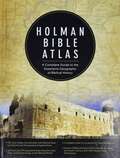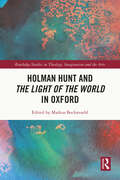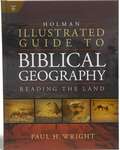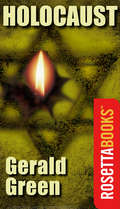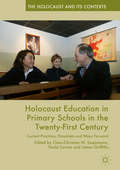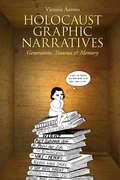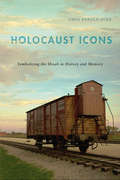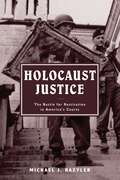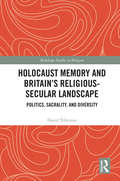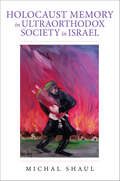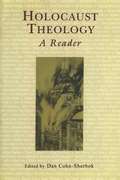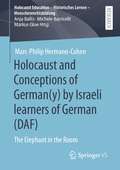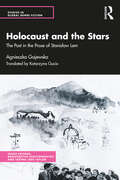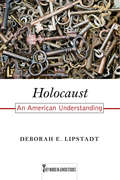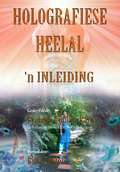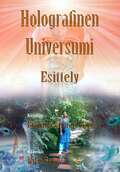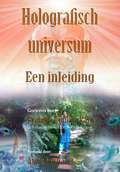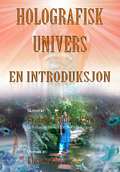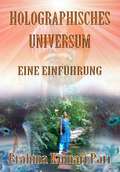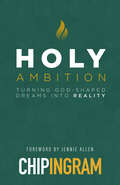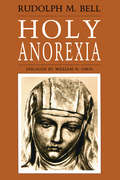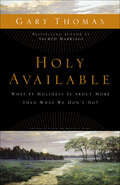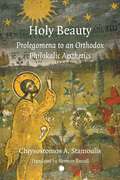- Table View
- List View
Holman Bible Atlas: A Complete Guide To The Expansive Geography Of Biblical History
by Thomas V. BriscoWinner of the ECPA Gold Medallion Book Award, the Holman Bible Atlas is the leading Bible atlas in the English language. Through the use of 132 full-color maps, more than 100 color photographs, timelines, chart summaries, and helpful sidebars, it places readers in the geographical, historical, and cultural contexts of the Bible and enables them to experience its perennially relevant message. The book is presented in two broad divisions: physical geography of the Ancient Near East and biblical history periods from the patriarchs to the Christian era until Constantine. The content is arranged in line with specific biblical texts so that teachers, pastors, and students will see the key events of the Bible and Christianity with exceptional clarity. There’s also a wealth of written and visual information regarding various people groups (Aramaeans, Moabites, Phoenicians, etc.), great empires (Egypt, Babylonia, Rome, etc.), and the road systems, agricultural year, and economic life of ancient civilizations based on archaeological recoveries.
Holman Hunt and the Light of the World in Oxford (Routledge Studies in Theology, Imagination and the Arts)
by Markus BockmuehlThis book provides an up-to-date introduction to the religious and artistic story behind The Light of the World by William Holman Hunt. Created in the mid-nineteenth century, it is often said to be the most widely exhibited work of art in history and remains one of the most widely known Christian paintings to this day. The subject matter provides a rich wealth of resources, touching on the extraordinary artistic renewal associated with the Oxford Movement, its religious and intellectual revolution in recovering early Christian tropes and motives of scriptural interpretation. The book also considers the painting’s impact on the religious and cultural life of the British Empire as its tour served not just spiritual edification but also the promotion of imperial values. The contributions reflect on concerns of decolonisation while illustrating religious art’s ability to engage relevantly with contemporary concerns. Enabling a fresh encounter with the painting, this book will be of interest to theologians, biblical scholars, and historians.
Holman Illustrated Guide to Biblical Geography: Reading the Land
by Paul Wright Holman Bible PublishersReading the land enables us to read the Bible with greater insight. Though the truths of the Bible transcend time and place, they are rooted in them. Geographical data inform our understanding of activity in the land of the Bible, while the Bible’s own description of these events, embedded deeply in the realia of the land itself, helps us better understand the living context in which these events took place. When we develop a skill set that allows us to read the land of the Bible as fluently as we might read the text, we stand not only to gain a better appreciation of the divine-human events of Scripture, we also gain an understanding of how these events become relevant to us in our own particular living contexts.
Holocaust
by Gerald GreenThe epic novel of two families and the genocide in Nazi Germany, by the writer of the blockbuster TV miniseries. The Dorfs are &“good&” Germans, loyal to the new Nazi regime, with whom their son Erik, a promising lawyer, finds his ambitions realized with the SS at the side of the ruthless Reinhard Heydrich. The Weisses are Jewish, also &“good&” Germans—but under the new regime, they are doomed. Told through the reminiscences of Erik Dorf, the ambitious SS officer, and the courageous young Jew Rudi Weiss, who ran away from his family as a young boy in an effort to fight the Nazis, this novel takes us through almost every significant event of the Third Reich, from the horrific reality of Kristallnacht to the mass exterminations at Auschwitz. It is a portrait of the extraordinary choices all Germans were forced to make on a daily basis—and the unimaginable consequences if they were wrong. A winner of the Dag Hammarskjöld International Prize, with more than two million copies sold, Holocaust is an unforgettable glimpse into this monumental human tragedy.
Holocaust Education in Primary Schools in the Twenty-First Century: Current Practices, Potentials and Ways Forward (The Holocaust and its Contexts)
by Paula Cowan Claus-Christian W. Szejnmann James GriffithsThis collection is the first of its kind, bringing together Holocaust educational researchers as well as school and museum educators from across the globe, to discuss the potentials of Holocaust education in relation to primary school children. Its contributors are from countries that have a unique relationship with the Holocaust, such as Germany, Israel, neutral Switzerland, and Allied countries outside the UK. Their research provides new insight into the diverse ways in which primary aged students engage with Holocaust education. Chapters explore the impact of teaching the Holocaust to this age group, school and museum teaching pedagogies, and primary students’ perspectives of the Holocaust. This book will appeal to school and museum educators of primary aged students whose work requires them to teach the Holocaust, Citizenship (or Civics) or Human Rights Education. Since the turn of the twenty-first century there has been a transformation in school and museum-based Holocaust education. This book clearly demonstrates that primary education has been included in this transformation.
Holocaust Graphic Narratives: Generation, Trauma, and Memory
by Victoria AaronsIn Holocaust Graphic Narratives, Victoria Aarons demonstrates the range and fluidity of this richly figured genre. Employing memory as her controlling trope, Aarons analyzes the work of the graphic novelists and illustrators, making clear how they extend the traumatic narrative of the Holocaust into the present and, in doing so, give voice to survival in the wake of unrecoverable loss. In recreating moments of traumatic rupture, dislocation, and disequilibrium, these graphic narratives contribute to the evolving field of Holocaust representation and establish a new canon of visual memory. The intergenerational dialogue established by Aarons’ reading of these narratives speaks to the on-going obligation to bear witness to the Holocaust. Examined together, these intergenerational works bridge the erosions created by time and distance. As a genre of witnessing, these graphic stories, in retracing the traumatic tracks of memory, inscribe the weight of history on generations that follow.
Holocaust Icons
by Oren Baruch StierThe Holocaust has bequeathed to contemporary society a cultural lexicon of intensely powerful symbols, a vocabulary of remembrance that we draw on to comprehend the otherwise incomprehensible horror of the Shoah. Engagingly written and illustrated with more than forty black-and-white images, Holocaust Icons probes the history and memory of four of these symbolic relics left in the Holocaust's wake. Jewish studies scholar Oren Stier offers in this volume new insight into symbols and the symbol-making process, as he traces the lives and afterlives of certain remnants of the Holocaust and their ongoing impact. Stier focuses in particular on four icons: the railway cars that carried Jews to their deaths, symbolizing the mechanics of murder; the Arbeit Macht Frei ("work makes you free") sign over the entrance to Auschwitz, pointing to the insidious logic of the camp system; the number six million that represents an approximation of the number of Jews killed as well as mass murder more generally; and the persona of Anne Frank, associated with victimization. Stier shows how and why these icons--an object, a phrase, a number, and a person--have come to stand in for the Holocaust: where they came from and how they have been used and reproduced; how they are presently at risk from a variety of threats such as commodification; and what the future holds for the memory of the Shoah. In illuminating these icons of the Holocaust, Stier offers valuable new perspective on one of the defining events of the twentieth century. He helps readers understand not only the Holocaust but also the profound nature of historical memory itself.
Holocaust Justice: The Battle for Restitution in America's Courts
by Michael J. BazylerThe first book to tell the complete story of the American attempt at restitution for victims of the HolocaustThe Holocaust was not only the greatest murder in history; it was also the greatest theft. Historians estimate that the Nazis stole roughly $230 billion to $320 billion in assets (figured in today’s dollars), from the Jews of Europe. Since the revelations concerning the wartime activities of the Swiss banks first broke in the late 1990s, an ever-widening circle of complicity and wrongdoing against Jews and other victims has emerged in the course of lawsuits waged by American lawyers. These suits involved German corporations, French and Austrian banks, European insurance companies, and double thefts of art—first by the Nazis, and then by museums and private collectors refusing to give them up. All of these injustices have come to light thanks to the American legal system.Holocaust Justice is the first book to tell the complete story of the legal campaign, conducted mainly on American soil, to address these injustices. Michael Bazyler, a legal scholar specializing in human rights and international law, takes an in-depth look at the series of lawsuits that gave rise to a coherent campaign to right historical wrongs. Diplomacy, individual pleas for justice by Holocaust survivors and various Jewish organizations for the last fifty years, and even suits in foreign courts, had not worked. It was only with the intervention of the American courts that elderly Holocaust survivors and millions of other wartime victims throughout the world were awarded compensation, and equally important, acknowledgment of the crimes committed against them. The unique features of the American system of justice—which allowed it to handle claims that originated over fifty years ago and in another part of the world—made it the only forum in the world where Holocaust claims could be heard. Without the lawsuits brought by American lawyers, Bazyler asserts, the claims of the elderly survivors and their heirs would continue to be ignored.For the first time in history, European and even American corporations are now being forced to pay restitution for war crimes totaling billions of dollars to Holocaust survivors and other victims. Bazyler deftly tells the unfolding stories: the Swiss banks’ attempt to hide dormant bank accounts belonging to Holocaust survivors or heirs of those who perished in the war; German private companies that used slave laborers during World War II—including American subsidiaries in Germany; Italian, Swiss and German insurance companies that refused to pay on prewar policies; and the legal wrangle going on today in American courts over art looted by the Nazis in wartime Europe. He describes both the human and legal dramas involved in the struggle for restitution, bringing the often-forgotten voices of Holocaust survivors to the forefront. He also addresses the controversial legal and moral issues over Holocaust restitution and the ethical debates over the distribution of funds.With an eye to the future, Bazyler discusses the enduring legacy of Holocaust restitution litigation, which is already being used as a model for obtaining justice for historical wrongs on both the domestic and international stage.
Holocaust Memory and Britain’s Religious-Secular Landscape: Politics, Sacrality, And Diversity (Routledge Studies in Religion)
by David TollertonBritish state-supported Holocaust remembrance has dramatically grown in prominence since the 1990s. This monograph provides the first substantial discussion of the interface between public Holocaust memory in contemporary Britain and the nation’s changing religious-secular landscape. In the first half of the book attention is given to the relationships between remembrance activities and Jewish, Muslim, Christian, and post-Christian communities. Such relationships are far from monolithic, being entangled in diverse histories, identities, power-structures, and notions of ‘British values’. In the book’s second half, the focus turns to ways in which public initiatives concerned with Holocaust commemoration and education are intertwined with evocations and perceptions of the sacred. Three state-supported endeavours are addressed in detail: Holocaust Memorial Day, plans for a major new memorial site in London, and school visits to Auschwitz. Considering these phenomena through concepts of ritual, sacred space, and pilgrimage, it is proposed that response to the Holocaust has become a key feature of Britain’s 21st century religious-secular landscape. Critical consideration of these topics, it is argued, is necessary for both a better understanding of religious-secular change in modern Britain and a sustainable culture of remembrance and national self-examination. This is the first study to examine Holocaust remembrance and British religiosity/secularity in relation to one another. As such, it will be of keen interest to scholars of Religious Studies, Jewish studies and Holocaust Studies, as well as the Sociology of Religion, Material Religion and Secularism.
Holocaust Memory in Ultraorthodox Society in Israel (Perspectives on Israel Studies)
by Michal ShaulHow did the Ultraorthodox (Haredi) community chart a new path for its future after it lost the core of its future leaders, teachers, and rabbis in the Holocaust? How did the revival of this group come into being in the new Zionist state of Israel? In Holocaust Memory in Ultraorthodox Society in Israel, Michal Shaul highlights the special role that Holocaust survivors played as they rebuilt and consolidated Ultraorthodox society. Although many Haredi were initially theologically opposed to the creation of Israel, they have become a significant force in the contemporary life and politics of the country. Looking at personal and public experiences of Ultraorthodox survivors in the first years of emigration from liberated Europe and breaking down how their memories entered the public domain, Shaul documents how they were incorporated into the collective memories of the Ultraorthodox in Israel. Holocaust Memory in Ultraorthodox Society in Israel offers a rare mix of empathy and scholarly rigor to understandings of the role that the community's collective memories and survivor mentality have played in creating Israel's national identity.
Holocaust Theology: A Reader
by Dan Cohn-SherbokWhere was God during the Holocaust? And where has God been since? How has our religious belief been changed by the Shoah? For more than half a century, these questions have haunted both Jewish and Christian theologians. Holocaust Theology provides a panoramic survey of the writings of more than one hundred leading Jewish and Christian thinkers on these profound theological problems. Beginning with a general introduction to Holocaust theology and the religious challenge of the Holocaust, this sweeping collection brings together in one volume a coherent overview of the key theologies which have shaped responses to the Holocaust over the last several decades, including those addressing perplexing questions regarding Christian responsibility and culpability during the Nazi era. Each reading is preceded by a brief introduction. The volume will be invaluable to Rabbis and the clergy, students, scholars of the Holocaust and of religion.
Holocaust and Conceptions of German: The Elephant in the Room (Holocaust Education – Historisches Lernen – Menschenrechtsbildung)
by Marc-Philip Hermann-CohenThe Holocaust is inseparable from the Israeli identities even seven decades following the atrocities during World War II, Israeli daily life is shaped by the horrible crimes committed by the Nazis. This book conceptualizes the intricacies of the Israeli identity in relation to learning German as a foreign language (GFL) in Israel throughout the course of history and the changing conception of Germany. This book includes an analysis of a selection of twenty-five GFL language books which reflect the stigmatization and tabooization of the Holocaust and also the qualitative analysis of a subject pool of 105 learners of GFL. The author finds that identities are co-constituted by four individualized Thought Styles, a concept borrowed from Ludwik Fleck. Thought Styles capture the individual perspective of the language learner’s view of Germany and are categorized in this thesis as German Engineering, Cold Germany, Neo-Nazi Germany, and The Other Germany. The research draws from discourse theory, critical psychology, and the oft-overlooked classical theory of Ludwik Fleck. Although the relationship between Germany and Israel has been amicable for the last six decades, the choice for Israelis to learn the language that was used by a nation that once attempted to eradicate the Jewish people is emotive and infinitely complex.
Holocaust and the Stars: The Past in the Prose of Stanisław Lem (Studies in Global Genre Fiction)
by Agnieszka GajewskaThis book is a groundbreaking study of one of the greatest science fiction writers, the Polish master Stanisław Lem. It offers a new direction in research on his oeuvre and corrects several errors commonly appearing in his biographies. The author painstakingly recreates the context of Lem’s early life and his traumatic experiences during the Second World War due to his Jewish background, and then traces these through original and brilliant readings of his fiction and non-fiction. She considers language, worldbuilding, themes, motifs and characterization as well as many buried allusions to the Holocaust in Lem’s published and archival work, and uses these fragments to capture a different side of Lem than previously known. The book discusses various issues concerning the writer’s life, such as his upbringing in a Jewish, Zionist-minded family, the extensive relations between the Lem family and the elite of Lviv at that time, details of the Lem family killed during the German occupation and attempts to reconstruct what happened to Lem’s parents and to the writer himself after escaping the ghetto. Part of the Studies in Global Genre Fiction series, this English translation of the Polish original, which has already been considered a milestone in Lem studies, offers a fresh perspective on the writer and his work. It will be an important intervention for scholars and researchers of Jewish studies, Holocaust literature, science fiction studies, English literature, world war studies, minority studies, popular culture, history and cultural studies.
Holocaust: An American Understanding
by Deborah E. LipstadtImmediately after World War II, there was little discussion of the Holocaust, but today the word has grown into a potent political and moral symbol, recognized by all. In Holocaust: An American Understanding, renowned historian Deborah E. Lipstadt explores this striking evolution in Holocaust consciousness, revealing how a broad array of Americans--from students in middle schools to presidents of the United States--tried to make sense of this inexplicable disaster, and how they came to use the Holocaust as a lens to interpret their own history. Lipstadt weaves a powerful narrative that touches on events as varied as the civil rights movement, Vietnam, Stonewall, and the women's movement, as well as controversies over Bitburg, the Rwandan genocide, and the bombing of Kosovo. Drawing upon extensive research on politics, popular culture, student protests, religious debates and various strains of Zionist ideologies, Lipstadt traces how the Holocaust became integral to the fabric of American life. Even popular culture, including such films as Dr. Strangelove and such books as John Hershey's The Wall, was influenced by and in turn influenced thinking about the Holocaust. Equally important, the book shows how Americans used the Holocaust to make sense of what was happening in the United States. Many Americans saw the civil rights movement in light of Nazi oppression, for example, while others feared that American soldiers in Vietnam were destroying a people identified by the government as the enemy. Lipstadt demonstrates that the Holocaust became not just a tragedy to be understood but also a tool for interpreting America and its place in the world. Ultimately Holocaust: An American Understanding tells us as much about America in the years since the end of World War II as it does about the Holocaust itself.
Holografiese Heelal: 'n Inleiding
by Brahma Kumari PariLees hierdie boek met die bedoeling om die diepte van wat verduidelik word, te verstaan. Moenie dit net as 'leesstof' beskou nie. In plaas daarvan om net die boek te lees om van die Holografiese Heelal te weet, hou aan na wat die skrywer gesê het totdat jy ervaar en verstaan wat gesê word oor die Holografiese Heelal. Om 'n oop, duidelike gedagte te hou (terwyl u dit visualiseer) sal u help om te ervaar wat die skrywer ervaar het en / of u kan ander relevante ervarings hê. As gevolg daarvan sal jy kan verstaan wat die skrywer verduidelik. U vermoë om ervarings in die Holografiese Heelal te hê, sal toeneem, aangesien u hierdie boek oor en oor lees totdat u dit verstaan het. Geniet die leeservaring!
Holografinen Universumi: Esittely
by Brahma Kumari PariLukemalla tätä kirjaa pystyt ymmärtämään paremmin Holografista Universumia, ja kykysi saada kokemuksia Holografisessa Universumissa kasvavat. Pitämällä mielesi avoimena ja vapaana (lukiessasi), voit kokea sitä, mitä kirjailijakin on kokenut ja pystyt myös ymmärtämään sen, mitä kirjailija on kirjassa selittänyt. Sen sijaan, että vain lukisit sanoja, lue kirjaa ymmärtääksesi sen, mitä siinä selitetään. Jatka sen pohtimista, kunnes koet ja ymmärrät sen, mitä Holografisesta Universumista sanotaan. Holografisen Universumin selitykset perustuvat tässä kirjassa seuraaviin: 1. Jumalalta tulevaan johdatukseen, 2. Brahma Kumarisin tietoon, 3. Kvanttimekaniikkaan (mikään tässä kirjassa ei ole kvanttimekaniikan vastaista), 4. tutkimuksiin, 5. kirjailijan omiin kokemuksiin, 6. chakroihin ja auraan liittyvään tietoon, 7. muinaisiin hindulaisiin teksteihin, jne. Tässä e-kirjassa on selityksiä näistä aiheista: 1. Holografisen Universumin luonteesta ja monista osioista. 2. Kuinka kaikki tapahtuu Maailman Näytelmän (Akaasisten Arkistojen) mukaan. 3. Kuinka ihmiset elävät samanaikaisesti kahdessa maailmassa, Oikeassa Maailmassa ja Holografisessa maailmassa. 4. Holografisesta Filmistä siinä Hologrammissa, jossa me olemme mukana. 5. Kuinka monenlaisia maailmoja on olemassa. 6. Kuinka kvanttienergiat aineellistavat aineelliset kehot ja aineellisen maailman Holografisessa Universumissa. 7. Kuinka luomisen prosessi tapahtuu pyörteiden ja chakrojen kautta. 8. Kuolemanrajakokemuksista. 9. Kosmisesta Tietoisuudesta. 10. Kuinka hienoiset ulottuvuudet, holografiset kehot ja hienoiset kehot on luotu. 11. Kuinka auraa käytetään kokemusten aikana. 12. Kuinka tiheydeltään erilaiset energiat aineellistavat sellaisen Oikean Maailman, jossa me voimme elää. 13. Kuinka Holografinen Universumi muuttuu silloin, k
Holografisch universum: Een inleiding
by Brahma Kumari PariDoor het lezen van dit boek heb je een beter begrip van het holografische universum en je vermogen om ervaringen op te doen in het holografische universum neemt toe. Door een open, heldere geest (terwijl je leest), kun je ervaren wat de auteur heeft meegemaakt en kun je begrijpen wat de auteur uitlegt. In plaats van alleen de woorden te lezen, lees je het met de bedoeling om de diepte van wat er wordt uitgelegd, te begrijpen. Blijf er over nadenken totdat je ervaart en begrijpt wat er over het holografische universum wordt gezegd. In dit boek zijn de verklaringen over het holografische universum gebaseerd op: 1. De begeleiding van God. 2. De kennis van de Brahma Kumaris. 3. Kwantummechanica (niets in dit boek is in strijd met kwantummechanica). 4. Onderzoek. 5. Ervaringen over de auteur. 6. De kennis van de chakra’s en aura. 7. De oude Hindoeïstische teksten, enz. Er staat uitleg in dit e-book over: 1. De verschillende divisies en de aard van het holografische universum. 2. Hoe alles volgens het werelddrama (Akashic-opname) verloopt. 3. Hoe mensen op hetzelfde moment in twee soorten werelden leven: de echte wereld en de holografische wereld. 4. De holografische film van het hologram waaraan we deelnemen. 5. Hoe verschillende soorten werelden bestaan. 6. Hoe de kwantumenergieën de fysieke lichamen en de fysieke wereld materialiseren door het holografische universum. 7. Hoe het scheppingsproces door de wervelingen en chakra's verloopt. 8. Bijna-doodervaringen. 9. Het kosmische bewustzijn. 10. Hoe subtiele dimensies, holografische lichamen en subtiele lichamen worden gecreëerd. 11. Hoe de aura wordt gebruikt tijdens de ervaringen. 12. Hoe kwantumenergieën van verschillende dichtheden een ander soort echte wereld voor ons materialiseren. 13. Hoe het holografische universum verandert als de wereld transformeert. 14. De meditatie e
Holografisk Univers: En Introduksjon
by Elisabet Norris Brahma Kumari PariHolografisk Univers: En Introduksjon av Brahma Kumari Pari Denne boken forklarer Det holografiske universet, innbefattet dets struktur, osv. Etter å ha lest denne boken, kommer du til å ha en bedre forståelse av Det holografiske universet, og din evne til å ha erfaringer i Det holografiske universet kommer til å styrkes. Ved å ha et åpent, klart sinn (mens du leser), kan du erfare det som forfatteren har erfart og forstå det som forfatteren forklarer. I stedet for å bare lese ordene, les den med hensikt om å forstå dybden av det som blir forklart. Fortsett å fundere på det til du erfarer og forstår det som blir sagt om Det holografiske universet. Fortsett å lese boken om og om igjen, helt til du forstår den slik at dine muligheter til å ha erfaringer i Det holografiske universet øker. I denne boken er erfaringene om Det holografiske universet basert på: 1. veiledningen fra Gud, 2. Brahma Kumaris’ kunnskap, 3. kvantemekanikk (ingenting i denne boken er i motsetning med kvantemekanikken), 4. undersøkelser, 5. forfatterens erfaringer, 6. kunnskap om chakraene og auraen, 7. de gamle hinduiske tekstene, osv. Det er forklaringer i denne e-boken om: 1. de forskjellige divisjonene og Det holografiske universets natur. 2. hvordan alt skjer ifølge Verdensdramatikken (akasha arkivene). 3. hvordan mennesker lever i two forskjellige verdener, Den virkelige verden og Den holografiske verden, samtidig. 4. Den holografiske filmen av hologrammet som vi deltar i. 5. hvordan forskjellige slags verdener eksisterer. 6. hvordan kvanteenergier materialiserer de fysiske legemene og den fysiske verden gjennom Det holografiske universet. 7. hvordan skapelsen skjedde gjennom virvlene og chakraene. 8. Nær Døden Erfaringer. 9. Den kosmiske bevisstheten. 10. hvordan subtile dimensjoner, holografiske legemer og subtile legemer er skapt. 11. hvordan auraen blir brukt i løpet av e
Holographisches Universum: -
by Brahma Kumari PariDieses Buch erklärt das holographische Universum, einschließlich seiner Struktur, usw. Durch die Lektüre dieses Buches werden Sie ein besseres Verständnis bezüglich des holographischen Universums haben und Ihre Fähigkeit, Erfahrungen im holographischen Universum zu machen, wächst. Durch das Aufrechterhalten eines offenen, klaren Geistes (beim Lesen) können Sie erleben, was der Autor erlebt hat, und Sie werden verstehen können, was der Autor erklärt. Anstatt nur die Worte zu lesen, lesen Sie es mit der Absicht, die Tiefen dessen zu verstehen, was erklärt wird. Denken Sie weiter darüber nach, bis Sie erfahren und verstehen, was über das holographische Universum gesagt wird. Lesen Sie das Buch immer wieder, bis Sie es verstanden haben, so dass Ihre Fähigkeit, Erfahrungen im holographischen Universum zu machen, zunimmt. In diesem Buch basieren die Erklärungen zum Holographischen Universum auf: 1. die Führung durch Gott, 2. die Kenntnis des Brahma Kumaris, 3. Quantenmechanik (nichts in diesem Buch steht im Gegensatz zur Quantenmechanik), 4. Forschung, 5. Erfahrungen der Autorin, 6. das Wissen über die Chakren und die Aura, 7. die alten hinduistischen Texte, usw. Es gibt Erklärungen, in diesem E-Book, über: 1. die verschiedenen Bereiche und Eigenschaften des holographischen Universums. 2. wie alles nach dem Weltdrama ( Akashachroniken) abläuft. 3. wie Menschen in zwei Arten von Welten leben, der realen und der holographischen Welt, zur gleichen Zeit. 4. der holographische Film des Hologramms, an dem wir teilnehmen. 5. wie verschiedene Arten von Welten existieren. 6. wie die Quantenenergien die physischen Körper und die physische Welt durch das holographische Universum materialisieren. 7. wie der Schöpfungsprozess durch die Wirbel und Chakren verläuft. 8. Nahtoderfahrungen 9. das kosmische Bewusstsein
Holy Ambition: Turning God-Shaped Dreams into Reality
by Chip IngramGod is a doer of great things. Isn&’t it time you joined His big plans?Human ambition is often rooted in pride. But &“holy ambition&”? That&’s something else! When your ambitions aren&’t about your own glory but God&’s, you&’ll find Him to be a source of empowerment that you can&’t get anywhere else. Pastor and radio teacher Chip Ingram invites you into something more daring than your current life. Holy Ambition takes you to the biblical story of Nehemiah, a humble servant of the king who became a leader of his people. Nehemiah could have kept his comfortable position in the palace, but instead he chose a radical path that allowed him to do amazing things for God. You can too! But you&’re going to have to take some risks. And that means you&’ve got to put aside fear or pride and start acting on your holy ambitions.It&’s time for the church to be what God wants: a people who will let Him do a powerful work in them and through them. No more living in the boring middle. Start living on the edge of God&’s groundbreaking work, and experience the exuberance of being on mission for Him!
Holy Ambition: Turning God-Shaped Dreams into Reality
by Chip IngramGod is a doer of great things. Isn&’t it time you joined His big plans?Human ambition is often rooted in pride. But &“holy ambition&”? That&’s something else! When your ambitions aren&’t about your own glory but God&’s, you&’ll find Him to be a source of empowerment that you can&’t get anywhere else. Pastor and radio teacher Chip Ingram invites you into something more daring than your current life. Holy Ambition takes you to the biblical story of Nehemiah, a humble servant of the king who became a leader of his people. Nehemiah could have kept his comfortable position in the palace, but instead he chose a radical path that allowed him to do amazing things for God. You can too! But you&’re going to have to take some risks. And that means you&’ve got to put aside fear or pride and start acting on your holy ambitions.It&’s time for the church to be what God wants: a people who will let Him do a powerful work in them and through them. No more living in the boring middle. Start living on the edge of God&’s groundbreaking work, and experience the exuberance of being on mission for Him!
Holy Anorexia
by Rudolph M. BellIs there a resemblance between the contemporary anorexic teenager counting every calorie in her single-minded pursuit of thinness, and an ascetic medieval saint examining her every desire? Rudolph M. Bell suggests that the answer is yes. "Everyone interested in anorexia nervosa . . . should skim this book or study it. It will make you realize how dependent upon culture the definition of disease is. I will never look at an anorexic patient in the same way again. "—Howard Spiro, M. D. , Gastroenterology "[This] book is a first-class social history and is well-documented both in its historical and scientific portions. "—Vern L. Bullough, American Historical Review "A significant contribution to revisionist history, which re-examines events in light of feminist thought. . . . Bell is particularly skillful in describing behavior within its time and culture, which would be bizarre by today's norms, without reducing it to the pathological. "—Mary Lassance Parthun, Toronto Globe and Mail "Bell is both enlightened and convincing. His book is impressively researched, easy to read, and utterly fascinating. "—Sheila MacLeod, New Statesman
Holy Anorexia
by Rudolph M. Bell&“A brilliant, disturbing study of anorexic behavior amongst medieval Italian female saints . . . original, controversial, superbly executed.&” —Kirkus Reviews Is there a resemblance between the contemporary anorexic teenager counting every calorie in her single-minded pursuit of thinness, and an ascetic medieval saint examining her every desire? Rudolph M. Bell suggests that the answer is yes. &“Everyone interested in anorexia nervosa . . . should skim this book or study it. It will make you realize how dependent upon culture the definition of disease is. I will never look at an anorexic patient in the same way again.&” —Howard Spiro, M.D., Gastroenterology &“[This] book is a first-class social history and is well-documented both in its historical and scientific portions.&” —Vern L. Bullough, American Historical Review &“A significant contribution to revisionist history, which re-examines events in light of feminist thought . . . Bell is particularly skillful in describing behavior within its time and culture, which would be bizarre by today&’s norms, without reducing it to the pathological.&” —Mary Lassance Parthun, Toronto Globe and Mail &“Bell is both enlightened and convincing. His book is impressively researched, easy to read, and utterly fascinating.&” —Sheila MacLeod, New Statesman
Holy Available: What If Holiness Is about More Than What We Don't Do?
by Gary ThomasTrue Christian faith is a profoundly transformational experience in which every part of our being is marked by God’s change and energized by his presence. This transformation takes us far beyond mere sin avoidance to a robust “full-bodied” holiness in which we make ourselves “holy available” to God every minute of the day. From Starbucks, to the office, to the soccer fields, to the boardroom, believers have the opportunity to carry the presence of Christ wherever they go. God offers the reader more than mere forgiveness; he wants to radically change and fill them with his presence, so they can experience an entirely different kind of life based not just on what they do or don’t do but on who they are.Yet while many Christians today profess belief, their Christianity has no pulse. Holy Available is a manifesto of fully alive faith. Gary Thomas issues a compelling call for readers to see with Christ’s eyes, feel with Christ’s heart, and serve with Christ’s hands. We make ourselves available to become “God oases,” places of spiritual refuge where God can bring the hurting and lost to enjoy his presence and ministry.
Holy Beauty: Prolegomena to an Orthodox Philokalic Aesthetics
by Chrysostomos A. StamoulisThe philosophical and theological study of aesthetics has a long and rich history, stretching back to Platos identification of ultimate goodness and beauty, together representing the eternal form. Recent trends in aesthetic theory, however, characterised by a focus on the beautiful at the expense of the good, have made it an object of suspicion in the Orthodox Church. In its place, Greek theologians have sought to emphasise philokalia as a truer theological discipline. Seeking to reverse this trend, Chrysostomos Stamoulis brings into conversation a plethora of voices, from Church fathers to contemporary poets, and from a Marxist political theorist to a literary critic. Out of this dialogue, Stamoulis builds a model for the re-appropriation of Orthodoxys patristic and Byzantine past that is no longer defined in antithesis to the Western present. The openness he proposes allows us to perceive afresh the world shot through with divinity, if only we can lift our gaze to see it. Dismantling the false dichotomy, philokalia or aesthetics, is the first step.
